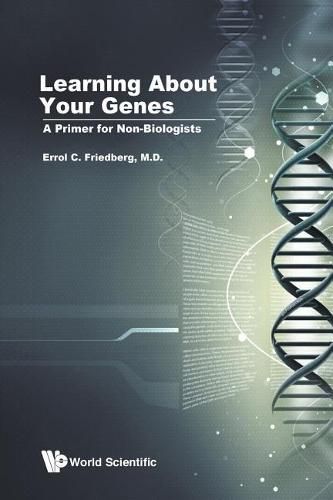Readings Newsletter
Become a Readings Member to make your shopping experience even easier.
Sign in or sign up for free!
You’re not far away from qualifying for FREE standard shipping within Australia
You’ve qualified for FREE standard shipping within Australia
The cart is loading…






Genes were unknowingly discovered in the 19th century by Gregor Mendel, a Czechoslovakian monk. It was later established that genes are made of DNA, a biological compound found in tiny thread-like structures called chromosomes that are located in the nuclei of all cells in our bodies. DNA consists of chains of entities called bases of which there are four in nature. DNA consists of long chains of bases (sometimes referred to as DNA sequences) that are joined in any order, but the precise order and length of which constitute different genes.Many (but not all) genes carry a code called the genetic code, a code that instructs the synthesis (manufacture) of the many hundreds of proteins that we require to survive and execute the many functions of life. The genetic code was deciphered in relatively recent years and is considered one of the most significant discoveries in the history of biology.Genes that encode instructions for the synthesis of proteins and those that regulate the manufacture of proteins comprise a mere two percent of our DNA. Despite our extensive knowledge of biology and the sub-discipline of molecular biology (the study of biology at the molecular level), the function (if any) of the rest of the DNA in our cells is unknown.Research about genes and DNA has in recent years spawned an endeavor referred to as the Human Genome Project, an international collaboration that has successfully determined, stored, and rendered publicly available the sequences of almost all the genetic content of the chromosomes of the human organism, otherwise known as the human genome.DNA sequences that are unique to every person on earth have been discovered (DNA fingherprints) and are now used for identifying criminals. The book relates a specific example of identifying a criminal who murdered two women.This is the first and only book that we are aware of that educates non-biologists about genes. It is written in a style and uses a vocabulary that can be comprehended by the average reader who knows very little if anything about genes.
$9.00 standard shipping within Australia
FREE standard shipping within Australia for orders over $100.00
Express & International shipping calculated at checkout
Genes were unknowingly discovered in the 19th century by Gregor Mendel, a Czechoslovakian monk. It was later established that genes are made of DNA, a biological compound found in tiny thread-like structures called chromosomes that are located in the nuclei of all cells in our bodies. DNA consists of chains of entities called bases of which there are four in nature. DNA consists of long chains of bases (sometimes referred to as DNA sequences) that are joined in any order, but the precise order and length of which constitute different genes.Many (but not all) genes carry a code called the genetic code, a code that instructs the synthesis (manufacture) of the many hundreds of proteins that we require to survive and execute the many functions of life. The genetic code was deciphered in relatively recent years and is considered one of the most significant discoveries in the history of biology.Genes that encode instructions for the synthesis of proteins and those that regulate the manufacture of proteins comprise a mere two percent of our DNA. Despite our extensive knowledge of biology and the sub-discipline of molecular biology (the study of biology at the molecular level), the function (if any) of the rest of the DNA in our cells is unknown.Research about genes and DNA has in recent years spawned an endeavor referred to as the Human Genome Project, an international collaboration that has successfully determined, stored, and rendered publicly available the sequences of almost all the genetic content of the chromosomes of the human organism, otherwise known as the human genome.DNA sequences that are unique to every person on earth have been discovered (DNA fingherprints) and are now used for identifying criminals. The book relates a specific example of identifying a criminal who murdered two women.This is the first and only book that we are aware of that educates non-biologists about genes. It is written in a style and uses a vocabulary that can be comprehended by the average reader who knows very little if anything about genes.